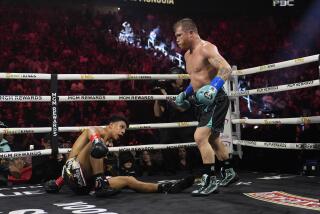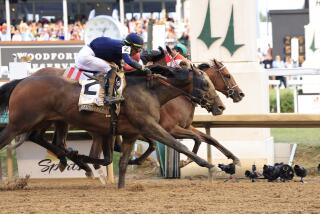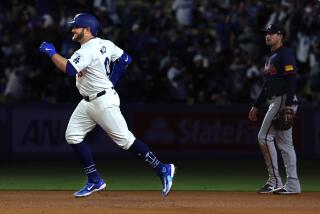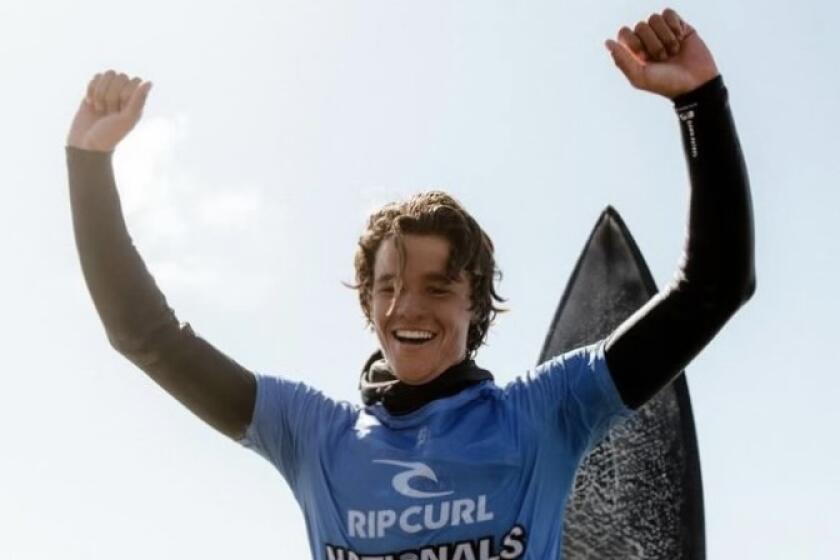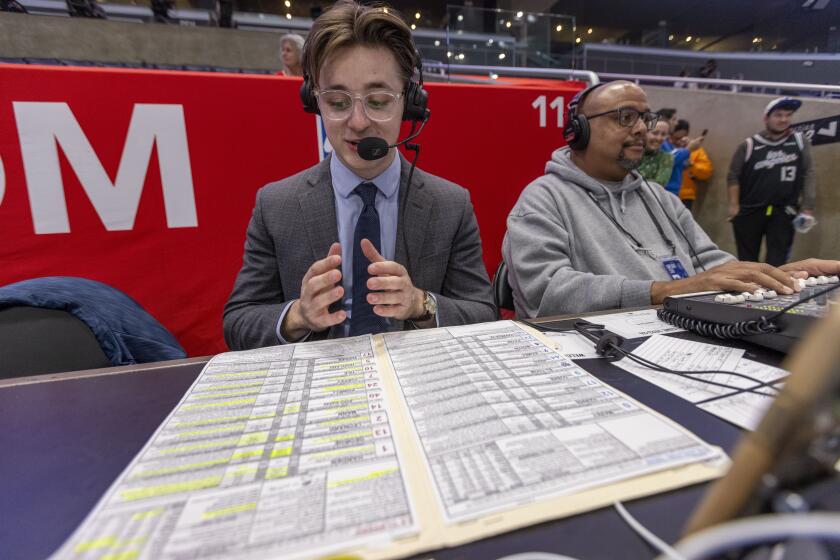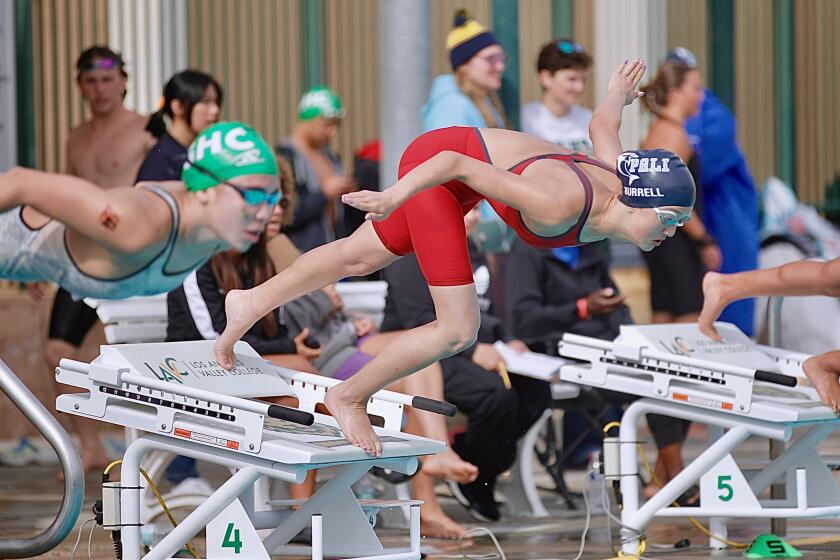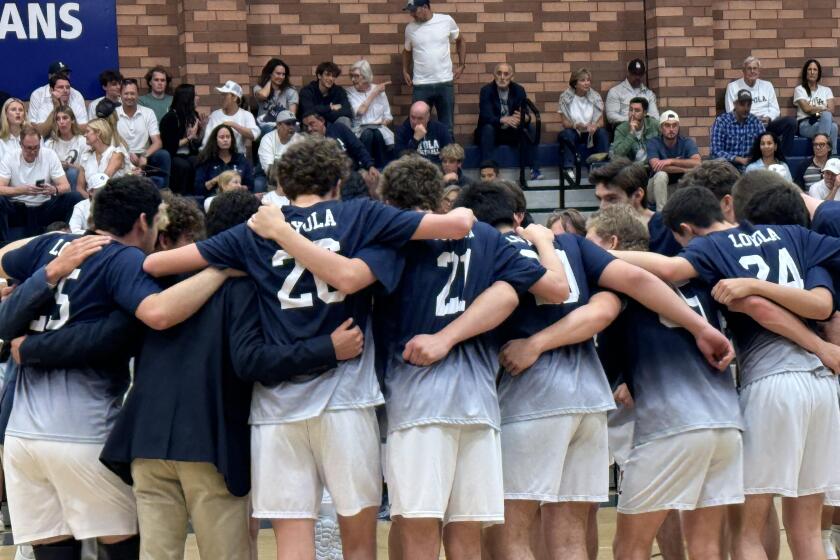This Time He Took Bull by the Horns
If you have any interest in golf, you had to be excited about the possibilities for Sunday’s final round of the British Open. When the day began, four players were tied for the lead, 27 players were within four strokes of them and Tiger Woods was five back, poised to make a Palmeresque charge.
It figured to be like the running of the bulls. The strong are coming through; everyone else run for your lives or get out of Pamplona--in this case, Royal Lytham & St. Annes Golf Club.
There is a certain fascination when Woods dominates a major tournament, such as in 1997 at the Masters or last year at the U.S. Open at Pebble Beach and the British Open at St. Andrews. We marvel when a performance reaches a level believed to have been unattainable--Joe DiMaggio’s 56-game hitting streak, Wilt Chamberlain’s 100-point game, Secretariat’s 31-length Belmont victory.
But, ultimately, the essence of sports is not athlete against history but athlete against athlete. It is difficult to find a contest more competitive than Sunday’s, when you could make a case for half the field.
Whoever won would have to play cleverly. Even in moderate weather conditions, a links course demands that. He would have to be lucky. A bounce this way, you’re in the fairway. A bounce that way, you’re in waist-high rough or a grave-deep bunker. He might have to grasp some magic from out of the Irish Sea air, as Bobby Jones did in 1926 and Seve Ballesteros did in 1979 with miracle shots at Royal Lytham.
Would the winner be, as Nick Price suggested, someone, such as Price, who had won a major? Or Colin Montgomerie, who, on this side of the Atlantic, is considered the best player never to have won a major? Or David Duval, one of the two American versions of that? (With another major up for grabs, Phil Mickelson was no factor. There’s nothing wrong with him that a tour with the Marine Corps couldn’t cure.)
Would it be Sergio Garcia, Jesper Parnevik or Darren Clarke? Or would it be an unknown such as Alex Cejka, Joe Ogilvie or Niclas Fasth who hadn’t figured out yet he was not supposed to be on the British Open leaderboard Sunday?
With a bogey on the first hole, Woods began his charge with a retreat. He recovered with birdies on Nos. 4, 5 and 6. But he triple-bogeyed the par-three 12th and that was that.
He finished at even-par 71 Sunday and one-under for the tournament, tied for 25th. It was the fourth tournament in a row in which Woods has finished out of the top 10. That might not be a slump, a word he doesn’t like, but it is for him a lull.
Other players still speak in awe of his talent, his intelligence and his cunning. They know he could start another streak at any time. But, after the U.S. Open at Southern Hills and this tournament, they know he can’t win any time he chooses. They weren’t sure before.
Davis Love III had the start Woods needed, four consecutive birdies to finish the front nine and another at 11 vaulting him to the leaderboard at five under.
Love spoke last week of his affinity for Royal Lytham because his father had his best British Open finish here, tying for sixth with Jack Nicklaus in 1969. But Love III bogeyed 13 and disappeared from the leaderboard. How cruel.
Crueler still was the fate awaiting Ian Woosnam when the leaders began to tee off.
He went from the elation of a near hole in one on the par-three No. 1, which he appeared to have birdied, to the despair of a two-stroke penalty for carrying too many clubs in his bag. His caddie had failed to leave out one of the two drivers they were working with on the practice range.
“You give a guy one job . . . ,” Woosnam said, angrily flinging the driver when the caddie pointed it out to him at the second tee.
He suddenly was at five under. He bogeyed Nos. 3 and 4, and, although he eventually got back to seven under, the afternoon was an uphill battle.
Fewer than 24 hours earlier, the Welshman had spoken of his affection for the game, this coming two weeks after he said he might quit.
“I think I shouldn’t have opened my mouth last time I said something,” Woosnam said Saturday. “I am in love with golf. I’m going to play as much as I can. I think the game is fantastic. I am going to play 52 weeks of the year, Christmas Day as well.”
Christmas seemed like a long way off Sunday.
As it turns out, there was only one real bull on the course.
That was Duval.
You can’t help but feel badly for the affable Woosnam, the 1991 Masters champion who, at 43, might not have another chance to win a major tournament. Who knows what might have happened if he hadn’t had his momentum interrupted by the unfortunate episode on No. 2?
But I’m glad he didn’t shave another two strokes off his score of 278--six under--because, if he had, the British Open no doubt would be remembered, especially in Great Britain, as the tournament he lost instead of the one that Duval won.
Make no mistake. Duval won. It was the second year in a row that he had earned a place in the final twosome on Sunday at the British Open. Last year, playing with Woods, Duval was within three of the lead with 11 holes to play when his back began to ache.
He shot 43 on the back side, including a quadruple-bogey eight at 17 where he needed four shots to escape from the notorious Road Bunker, and finished tied for 11th.
Duval took 10 weeks off to rest and came back strong in his first major this year. He finished second in the Masters, two shots behind Woods. Critics said Duval choked because he missed short putts at 16 and 18, but he challenged them after shooting 65 here Saturday to tie for the lead.
“Whether you want to say I blew it this year, I shot the low round of the day still,” he said. “I know I have it in me. I think I have proven it.”
He left no room for doubt Sunday. While the other leaders at the start of the day slid down the leaderboard, he was steady. He had one bogey, at 12, and quickly recovered with a birdie at 13. Then he navigated the treacherous final holes, parring in for a 67 and a three-stroke victory.
He won’t have to hear again that he is one of the best players never to have won a major. Christmas came early for him.
*
Randy Harvey can be reached at randy.harvey@latimes.com
More to Read
Get our high school sports newsletter
Prep Rally is devoted to the SoCal high school sports experience, bringing you scores, stories and a behind-the-scenes look at what makes prep sports so popular.
You may occasionally receive promotional content from the Los Angeles Times.
